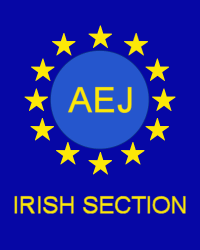The AEJ Irish Section hosted a debate on the Lisbon Reform Treaty at the Stephen’s Green & Hibernian Club, Dublin 2 on Friday, April 10. Fine Gael MEP Mairéad McGuinness argued the case ‘for’ and Sinn Fein MEP May Lou McDonald the case ‘against’.
Ms McDonald argued that the treaty would create democratic deficiencies and that it failed to deliver good governance on the part of the EU. From a military perspective, the treaty advised “in the wrong direction”, she said. Explicit public services such as health and education needed to be fenced off from Brussels and that did not happen in this treaty.
Ms McDonald said she also wished to quell the myth that being against the treaty amounted to being anti-Europe. Nothing could be further from the truth. Sinn Fein argued a positive position on Europe.
She also read a paragraph from a letter from the President of the Constitution Affairs Committee which argued that all politically sensitive material should be left untouched until after the referendum in Ireland. In short, she said the clear answer to the question would a ‘yes’ vote lead Ireland on a positive path was ‘no’.
Arguing the case ‘for’, Mairead McGuinness said there was a clear need for more and fuller information and the biggest worry was that people would not vote at all. She herself had spoken to people and while many were quite unsure as to what the treaty contained, some were quite expert on it.
She said the suggestion was put about that by rotating the Commissioners after 2014, Ireland would lose out. However, all countries would have to rotate their commissioners and, so, there was total equality among larger and smaller states.
Europe, she said, worked on consensus and there were no winners or losers. This did not make for news headlines but the consensus system works.
It should be remembered, she argued, that the Lisbon Treaty was not created by two or three faceless bureaucrats in Brussels but by elected representatives of the people of Europe over a period of years.
After the presentations, the MEPs answered questions from members during a stimulating and lively debate chaired by Section chair Eileen Dunne.

